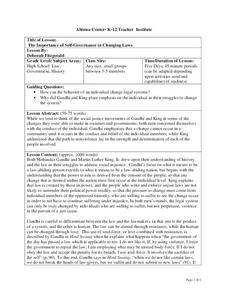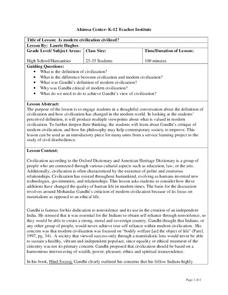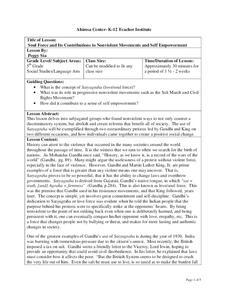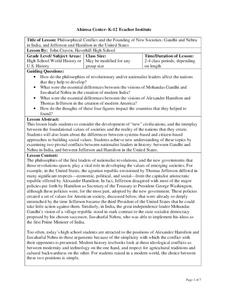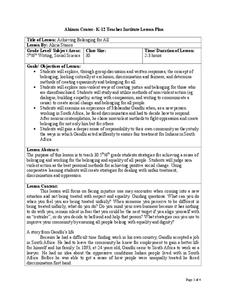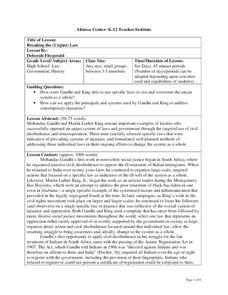Curated OER
The Power of Autobiographical Writing
Students explore the concept of injustice. In this nonviolent resistance lesson, students discuss how autobiographical writing may be used to promote justice. Students read an excerpt from Gandhi's autobiography and determine how his...
Curated OER
Can Forgiveness Lead to Nonviolence?
Tenth graders determine if forgiveness can lead to nonviolence. In this nonviolent resistance lesson, 10th graders discuss the concept of forgiveness and read examples of the forgiveness that Gandhi granted. Students write letters of...
Curated OER
The Power of Nonviolent Struggle
Young scholars identify how Mohandas Gandhi developed a nonviolent crusade for justice. In this nonviolent protest lesson, students watch segments of a documentary about Gandhi's reaction to imperialism in India. Young scholars write...
Curated OER
The Importance of Self-Governance in Changing Laws
Students examine the teachings of Gandhi and King. In this nonviolent resistance lesson, students listen to a lecture that reveals how Gandhi and King educated their followers about nonviolent resistance. Students analyze contemporary...
Curated OER
Is Modern Civilization Civilized?
Students examine the concept of civility. In this modern civilization activity, students study Gandhi's teaching about the attributes of civilized societies and discuss how they can contribute to fostering civilization in their own...
Curated OER
Paradigm Shift: Gandhian Nonviolence and the Concept of Power
Students interpret historical evidence presented in primary and secondary resources. In this social justice lesson, students examine sources regarding the teachings of Mohandas Gandhi pertaining to nonviolent...
Curated OER
Satyagraha in Daily Life
Eighth graders explore the concept of satyagraha. In this Mohandas Gandhi instructional activity, 8th graders read a story titled, "Satyagraha," and discuss the application of the Gandhi's method in the world today.
Curated OER
Soul Force and Its Contributions to Nonviolent Movements and Self Empowerment
Fifth graders explore the concept of Satyagraha. In this nonviolent resistance lesson, 5th graders listen to a lecture about Gandhi's teachings and determine how the soul force contributes to a sense of self empowerment.
Curated OER
Another Perspective on Modern Civilization
Students consider the impact of current issues on the world population. In this global studies lesson, students discuss the pros and cons of modernization after they listen to a lecture about Gandhi's opinion of modern civilization....
Curated OER
Designing a Civilization for an Art Room
Students discover the ideas of civilizations by researching Gandhi's philosophies. For this art decoration lesson, students investigate Gandhi's opinions on civilizations, community and ethics. Students collaborate by decorating an art...
Curated OER
Ahimsa as a Moral Force
Students explore the concept of Ahimsa. In this peace and tolerance lesson plan, students discuss Gandhi's application of Ahimsa and Satyagrah as they view the motion picture titled, "Gandhi." Students also discuss how effective...
Curated OER
Ahimsa and Making Nonviolent Choices with Gandhi and King
Students investigate nonviolent lifestyles by researching the biographies of Martin Luther King Jr and Gandhi. In this peace lesson, students define the term Ahimsa and describe Gandhi's lifestyle. Students identify the six principles...
Center for Civic Education
The Power of Nonviolence: Change Through Strategic Nonviolent Action
How did major historical figures, such as Henry David Thoreau, Susan B. Anthony, and Mohandas K. Gandhi, explain and defend their beliefs in nonviolence? Your learners will begin by studying the backgrounds of these individuals, and then...
Curated OER
The Power of Our Words: Using Language that Promotes Nonviolence
Students solve conflicts through nonviolent means. In this problem resolution lesson plan, students practice solving problems in different social settings. They try many nonviolent phrases and they create their own solutions.
Curated OER
Ahimsa in the Real World: Truth, Love, and Nonviolence
Second graders create an abstract painting that conveys feelings of nonviolence. In this visual arts lesson, 2nd graders read "The First Step of Jainism" and discuss honesty, watch a digital story, discuss feelings after watching the...
Curated OER
Philosophical Conflict and the Founding of New Societies: Gandhi and Nehru in India, and Jefferson and Hamilton in the United States
Students explore the foundations of "new societies" such as those created by figures like Jefferson & Ghandi, The evaluate the differences between what was intended and the actual reality of these societies including where the came...
Curated OER
Take a Walk in Their Shoes: Great Leaders of Our Time
Research the characteristics of leaders who have used nonviolence to change society. The class then applies this information to their own community to find leaders with these same characteristics, creating a wall collage of pictures and...
Curated OER
Achieving Belonging for All
Students explore ways of belonging. For this social science lesson, students discover non-violent ways for belonging similar to Mohandas Gandhi.
Curated OER
Martin Luther King, Jr., and the Power of Nonviolence
Middle schoolers examine the philosophy of nonviolence developed by Martin Luther King, Jr. and how this turned into practice during the Civil Rights Movement. They compare these teachings to those of Mohandas K. Ghandi.
Curated OER
Freedom Now
Students watch a short video on colonial rule. They discuss how lives were changed once independence was granted in India. They create mock interview sessions acting as political figures involved in an independence movement. They...
Curated OER
Non-violent Protest Through The Ages
Middle schoolers are introduced to non-violent ways to solve disagreements with others. In groups, they analyze the ways Martin Luther King, Gandhi and Thoreau shared their views in non-violent ways. They complete a sketch of the life...
Curated OER
Breaking the Unjust Law
Students consider the concept of civil disobedience. In this lesson on changing unjust laws, students use primary sources to understand how Gandhi and King changed the law. Students will then list laws that they feel are unjust and plan...
Curated OER
Youth Participation in Nonviolence
Students explore the use of nonviolent resistance. In this social justice lesson, students listen to their instructor present a lecture on Mohandas Gandhi and Martin Luther King, Jr. as well as the Apartheid Movement in South Africa.
Curated OER
Individual Empowerment in the Face of Oppression
Sixth graders investigate non-violent ways of dealing with conflicts by performing short plays. In this philosophy instructional activity, 6th graders discuss how men can gain power in a non-violent manner similar to Gandhi's actions....





